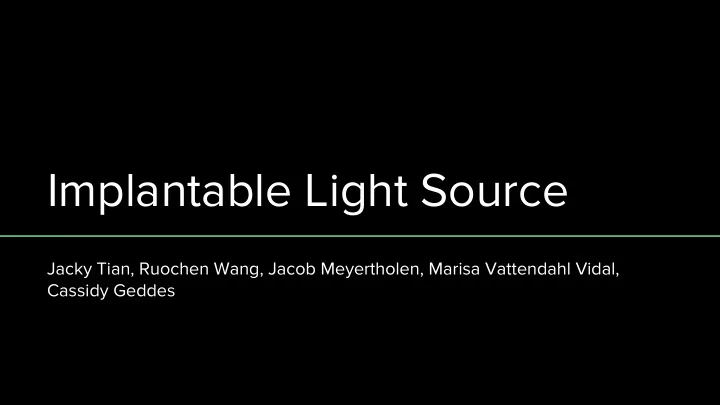

Implantable Light Source Jacky Tian, Ruochen Wang, Jacob Meyertholen, Marisa Vattendahl Vidal, Cassidy Geddes
Overview ● Background Problem Statement ● ● PDS ● Components ● Design: Disco Bulb Design: Bioluminescent Liquid ● ● Design: Magnetic Fan ● Design: LED Mat ● Design Matrix Future Work ●
Background Dr. Sandor and his team are using fiber optic photoconversion to observe the ● behavior of immune cells when mice are infected with tuberculosis. ● Fiber optic photoconversion uses 405 nm led lights to change the color of the infected cells to red, which allows them to observe the movement of the immune cells (green) in and out of the infected areas. S Marcus
Problem Statement ● Current photoconversion methods are not efficient. ○ Not all photoconversion sites can be found ○ Fiber optic light can only reach a small area of the lungs ○ The light is currently administered through a small tube, which makes it hard for the mice Dr. Sandor’s Lab to move ● Needs a more efficient method that will photoconvert larger area.
Product Design Specifications (PDS) ● Size Small enough to fit in or on mouse ○ ● Wavelength of Light Source ○ 405nm and 470nm ● Non-Harmful Light medium.economist.com ○ No UV light Budget ● quora.com
Components ● LED’s LED Luxeon Royal Blue ○ stevesleds.com ○ Small OLED Display Bioinert Biomaterial ● ○ UHMWPE ○ Aluminum ○ Titanium ● Circuit thinglink.com metalsupermarkets.com
“Disco Bulb” Outside Inside lens lungs Light rays
“Disco Bulb” Pros Cons ● Minimize the incision size ● Manufacture of the lens ● Reusability ● Material selection ● Modifiable ● Light intensity
Bioluminescent Liquid Pros Cons ● Easy Operation ● Proper wavelength ● Less damage to the mice ● Reusability ● More temperature control ● Economic efficiency
Magnetic Fan Pros Cons ● The lights can cover a large area ● Limited space to expand the fan ● Less damage during implantation ● Strength of magnetic force ● Easy manipulation ● Size
Magnetic Fan
LED Mat - Flexible, three dimensional, biocompatible mat - LED lights will be alternated across the rows and down the columns between the two different wavelengths - Microcontroller allows device to be automated Pros Cons ● Allows the client to easily switch between ● More invasive the desired wavelengths ● Size ● Flexible material that wraps around mice’s skull or ribcage ● Can be easily manipulated to fit other projects of Professor Sandors ● Broad scope of light
Design Matrix Criteria Magnetic Fan Disco Bulb Bioluminescent LED Mat (weight) Liquid Cost (5) 4 3 5 4 Safety (20) 6 16 12 16 Size (15) 10.5 12 7.5 10.5 Efficiency (25) 20 17.5 12.5 20 Ease of Use (10) 6 7 8 8 Feasibility (10) 4 7 2 7 Materials (15) 10.5 12 9 12 Total (100) 61 74.5 56 77.5
Future Work ● Finding the correct LEDs Programming ● ● Figuring out Bluetooth/wireless ● Making lighting device small enough
Acknowledgement Our team would like to thank Dr. Skala for her guidance and thank Dr. Sandor’s Lab for providing us the opportunity to work on this project.
Sources ● http://www.fluorocarbon.co.uk/news-and-events/post/18/what-is-ultra-high-molecular-weight-polyethylene-uhmwpe ● https://www.azom.com/article.aspx?ArticleID=2630 ● Schmidt A., Westendorf C., Ridelis I. “Photoconversion.” Internet: https://www.leibniz-fmp.de/fileadmin/user_upload/Cellular%20Imaging/pdf/Photoconversion.pdf [Oct. 2, 2018] ● Turkowyd B., Balinovic A., Virant D., Carnero H., Caldana F., Endesfelder M., Bourgeois D. “Photoconversion of Green-to-Red Fluorescent Proteins Based on Blue and Infrared Light.” Internet: https://www.ncbi.nlm.nih.gov/pubmed/28574633 , 2017 [Oct. 3, 2018] ● Dr. Sandor and team
Questions?
Recommend
More recommend